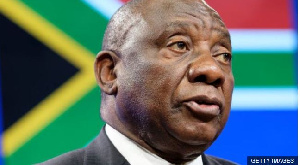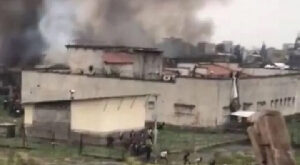Despite all the warnings, Mama Pinda and Mama Thando decided to go to church.
Dressed in skirts and colourful headwraps, the two ladies in their late thirties met on Monday evening to walk to their church service in Troyeville, Johannesburg. Now more than ever, they felt the urge to pray.
“People are scared,” said Mama Pinda, as she hurried up the hill.
“We are chasing the coronavirus away in our prayer,” she added with a laugh.
Mama Pinda and her friend, who brought her toddler along, stubbornly tried to defy the appeals to avoid crowded spaces amid a general atmosphere of hesitation in the streets that followed the announcement by South African President Cyril Ramaphosa of a series of drastic measures to curb the spread of the new coronavirus.
When he addressed the nation on Sunday evening, Ramaphosa called “for a change of behaviour amongst all South Africans”.
Gatherings of more than 100 people were prohibited while the population was advised to minimise contact with others and do the “elbow greeting” rather than shaking hands. Schools, nurseries and universities were also ordered to remain shut from Wednesday onwards.
“Never before in the history of our democracy has our country been confronted with such a severe situation,” Ramaphosa said in a dramatic speech, which he opened by declaring a national state of disaster.
By the end of his address, everything seemed to have changed.
“Suddenly, South Africans jolted into action,” said Professor Mosa Moshabela, from the School of Nursing and Public Health of the University of Kwazulu Natal. “And that is good,” added Moshabela, who is convinced that the country’s fighting chance against the new coronavirus is social distancing and precautious behaviour.
Outcomes of the Special Cabinet Meeting on the #CoronaVirusSA outbreak #COVID19SA https://t.co/7wNdxac82L
— Cyril Ramaphosa ?? (@CyrilRamaphosa) March 15, 2020
Source: aljazeera.com
 Home Of Ghana News Ghana News, Entertainment And More
Home Of Ghana News Ghana News, Entertainment And More





